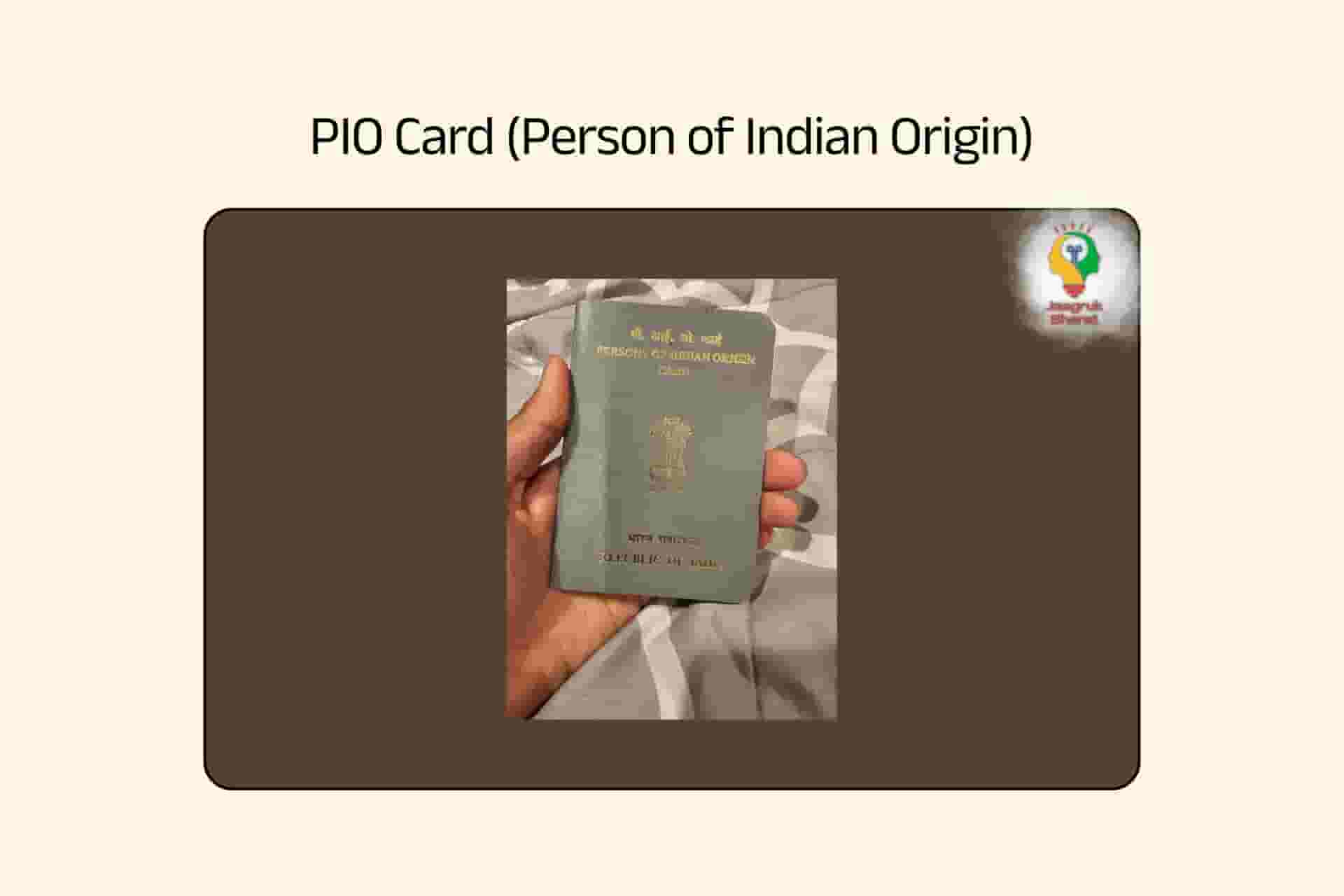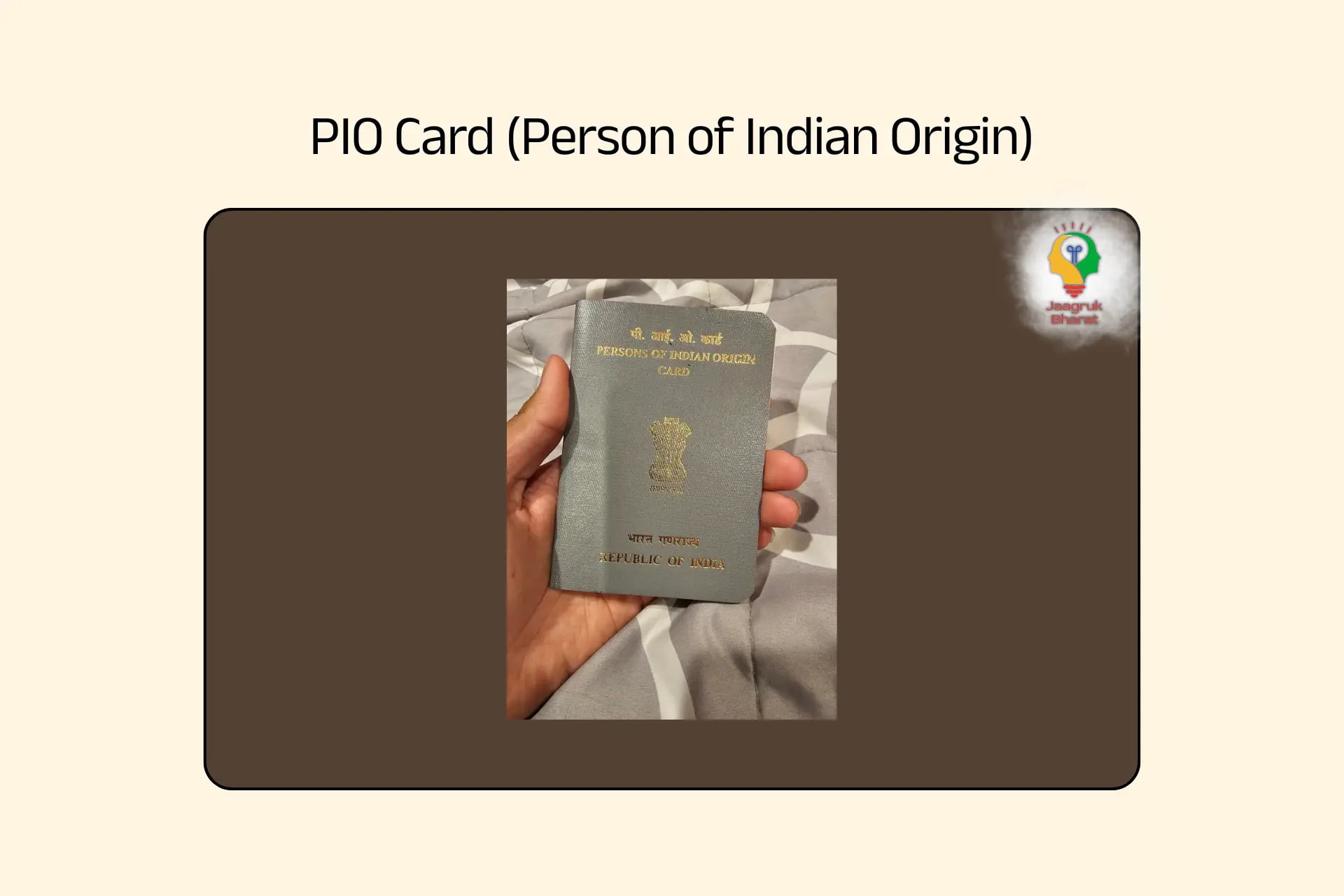What Is A PIO Card (Person of Indian Origin)? A Complete Guide
Updated: 13-10-2025 at 7:42 AM
1k


The PIO Card served as a bridge for Indian-origin individuals worldwide, fostering cultural and economic connections with their ancestral homeland. It allowed cardholders to travel to India without the need for visas, enabling seamless visits for personal, professional, or educational purposes. By simplifying residency and participation in local opportunities, the PIO Card reinforced India’s commitment to engaging with its global diaspora.
The PIO card was rendered obsolete in 2019 due to the launch of the OCI (Overseas Citizenship of India) card. This article will analyse PIO occupancy permits, their benefits, historical significance, and the process of acquiring an OCI card in detail.
Read More: What Are The New Ration Card Rules Effective From September 2024?
Overview Table
| Feature | Details |
|---|---|
| Full Form | Person of Indian Origin Card |
| Launch Year | 2002 |
| Validity | 15 years from the date of issuance |
| Eligibility | Individuals of Indian origin up to four generations, except from restricted countries |
| Key Benefits | Visa-free travel, financial and educational parity with NRIs |
| Limitations | No political rights, restrictions on certain properties, registration for long stays |
| Discontinuation Date | September 30, 2019. |
| Replaced By | Overseas Citizenship of India (OCI) Card |
What Is A PIO Card?
The PIO Card came into existence in an attempt to enable Overseas Indians with dual nationality, the facility to reside in India with relative ease. Even though the PIO card didn’t provide dual citizenship, it offered a middle-way solution by offering a few advantages like travel to India without a visa and doing business in India.
Since the PIO Card was merged with the Overseas Citizenship of India (OCI) Card in 2019, the concern of PIO Cardholders along with all OCI cardholders falls under one umbrella which is an easier process for overseas Indians.
Benefits Of A PIO Card
The PIO card presents numerous advantages that ease the workload of people with Indian heritage who work in or visit India. It grants visa-free access to the country and equal rights in education as well as owning property. Below are the important advantages of a PIO card:
-
No need to apply separately for tourist, student and employment visas for India.
-
For stays less than six months, no registration is a must. However, trips longer than that necessitate registration at FRRO or FRO in the location of the trip.
-
Apart from purchasing agricultural land NRIs are entitled to such property, housing provision, and enrollment in educational institutions.
-
For adoption procedures per country, immigrants apply for a similar role as NRIs.
-
Domestically within the country, Indian rates are used for national parks, wildlife areas, and airfare.
Limitations Of A PIO Card
While the PIO card offers many benefits, it also has some limitations. Certain rights and activities are restricted for PIO cardholders. Here are the main limitations of a PIO card:
-
No Political Rights: PIO holders cannot vote or hold constitutional posts.
-
Property Restrictions: Cannot purchase property in Jammu & Kashmir.
-
Activity Restrictions: Requires prior government permission for missionary work, mountaineering, and visiting restricted/protected areas.
Read More: Dr. Ambedkar Scheme Of Interest Subsidy On Educational Loans For Overseas Studies
Validity
The PIO card came with a long validity period, making it convenient for holders. However, its validity depended on the passport being current. Here’s the main detail about the validity of the PIO card:
- The PIO card was valid for 15 years from the date of issuance, subject to the validity of the holder’s passport.
Documents Needed
To apply for a PIO card, you need to provide specific documents to prove your Indian origin and current residency. Make sure all the required documents are accurate and meet the guidelines. Here’s what you need to include in your application:
-
Completed PIO application form.
-
Proof of Indian origin (e.g., Indian passport of self or ancestors).
-
Current passport (original and copy).
-
Proof of address.
-
Photographs meeting specifications.
-
Additional documents for applicants applying as a spouse of an Indian-origin individual.
About OCI Card
Aiming to help such a large immigrant Indian population, who settle in a foreign country, the Indian Government launched the Overseas Citizenship of India (OCI) Card in the year 2005. It amalgamates the features of two prior categories of cards offered.
Changing From PIO To OCI Card
Merging benefits from the PIO and OCI cards to ease processes for overseas Indians. As of 30th September 2019, PIO card holders were required to convert their cards to OCI cards.
Benefits Of PIO And OCI Cards
PIO and OCI cards are beneficial to those Indian-origin individuals who would like to maintain a link with India. These cards smoothen travel, education, and business opportunities in a great way. The PIO and OCI cards have the following benefits:
-
Travel Freedom: Visa-free entry to India.
-
Economic Opportunities: Parity with NRIs in financial matters.
-
Educational Benefits: Access to NRI quotas in Indian institutions.
-
Residency Rights: Long-term residency in India without restrictions.
Key Differences Between PIO vs. OCI Card
| Feature | PIO Card | OCI Card |
|---|---|---|
| Validity | 15 years | Lifetime |
| Registration | Required for stays over 6 months | Not required |
| Political Rights | None | None |
| Property Restrictions | Cannot buy agricultural land | Cannot buy agricultural land |
| Eligibility | Four generations back | Children of Indian-origin parents |
| Fee | Lower | Higher |
How To Choose Between PIO And OCI?
As the PIO card is no longer valid, someone who qualifies for it should directly apply for the OCI card as it has greater advantages is valid for a lifetime and it doesn’t require one to register for long-term stay in the region.
Conclusion
The PIO card has been essential for overseas Indians to develop links with the country. The government has however improved upon the existing processes, and with the introduction of OCI Cards now, offers even wider benefits to people of Indian origin. It is therefore a must for all PIO Card holders to upgrade to an OCI Card to retain these benefits.
Join the conversation and stay informed! Visit the Jaagruk Bharat community page here and be part of an active, engaged community.
Frequently Asked Questions
0
0
1k
0
0
1k Views
0
No comments available





Our Company
Home
About
T&C
Privacy Policy
Eula
Disclaimer Policy
Code of Ethics
Contact Us
Cancellation & Refund Policy
Categories
Women
Insurance
Finance
Tax
Travel
Transport & Infrastructure
Food
Entertainment
Communication
Government ID Cards
E-commerce
Traffic guidelines
Miscellaneous
Housing and Sanitation
Sports
Startup
Environment and Safety
Education
Agriculture
Social cause
Employment
Disclaimer: Jaagruk Bharat is a private organization offering support for documentation and government scheme access. We are not affiliated with any government body. Official services are available on respective government portals. Our goal is to make processes easier and more accessible for citizens.
All Copyrights are reserved by Jaagruk Bharat